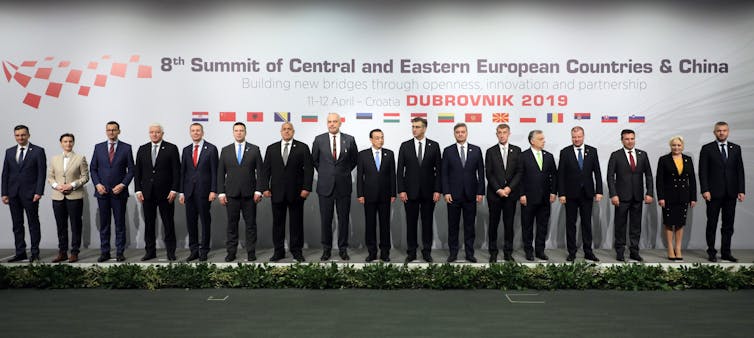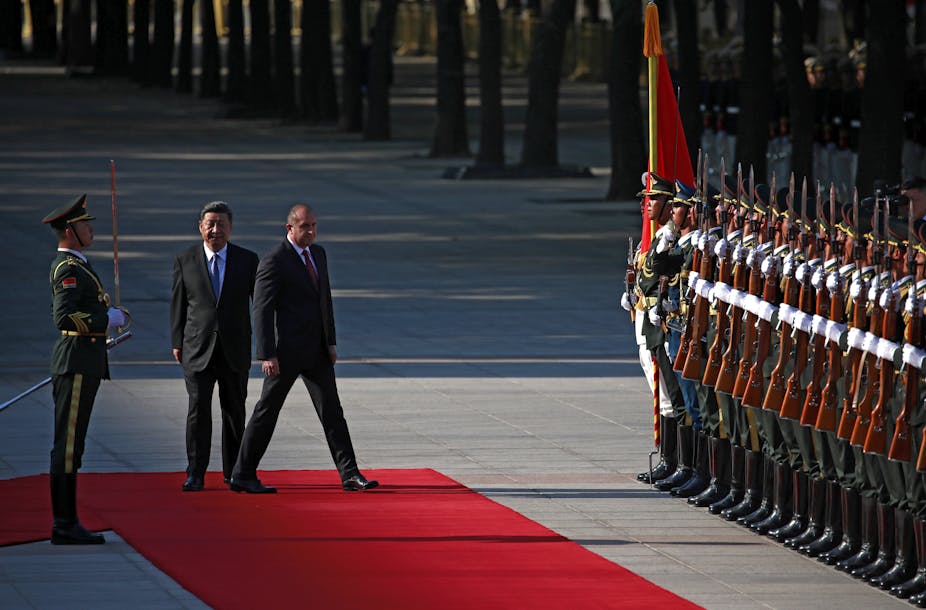Bulgaria became the most recent country from central and eastern Europe (CEE) to show hostility toward China. In the latest sign of relations souring between the region and the Asian superpower, Bulgaria’s prime minister, Boïko Borissov, claimed that a series of compromising pictures, appearing to show him sleeping with a gun and wads of cash by his bedside, were acquired by his opponents with a drone supplied by the Chinese government. This was the same Borissov who had hosted a China-CEE summit 2018 in Sofia despite persistent EU pressure not to do so.
Bulgaria is not the only country in the region to have qualms about China. In the Czech Republic, Prague city council ended its sister-city relationship with Beijing in October 2019 in favour of a partnership with Taipei. The president of the senate then announced plans to visit Taiwan in August in defiance of China.
In May, the Lithuanian foreign minister called for Taiwan to be reinstated to the World Health Organization. The same month, CEE officials were among signatories of a protest letter against China’s introduction of national security legislation in Hong Kong.
17 + China
This falling out comes after a decade of cooperation between China and eastern Europe, under the banner of the so-called “17+1” initiative. The cooperation began in April 2012 with a meeting in Warsaw between the then Chinese premier, Wen Jiabao, and representatives of 16 CEE countries, including 11 EU members. Wen promised investments and infrastructure development that would boost the regional economies.
For China, the region promised cheap access to European markets. The initiative was quickly co-opted into China’s wider Belt and Road Initiative, which launched the following year. When Greece joined as the 17th member in 2019, it elevated the political significance of the now 17+1 alliance even further.
In January 2020, Chinese President Xi Jinping announced he would host the annual 17+1 summits in future, rather than the premier, Li Keqiang. But this has done little to heal relations. CEE countries had already begun socially distancing from Beijing and the coronavirus pandemic has only accelerated this process. While there are many reasons for the rift, three stand out.
Just for the photo-op
First, China has not fulfilled the lavish promises it made to the region for large-scale investments. Chinese foreign direct investment in the EU peaked in 2016 at US$43 billion, then plummeted back to 2012 levels in 2019, with the expectation that 2020 would be even lower.
After years of 17+1 summits, eastern European politicians realised that it was the photo opportunities rather than meaningful discussion that mattered more to their Chinese counterparts. The ornate photo albums from these events were meant to advance careers back home rather than develop initiatives in the CEE region.

The Czech president, Milos Zeman, one of the most pro-Chinese of the region’s politicians, pointed to the lack of actual investments as the reason for shunning the 17+1 summit in April. In the event, the summit was postponed because of the pandemic, and now appears to be deferred indefinitely.
Second, growing frustration with their marginalisation has led CEE countries to reflect on their political identity. In particular, the wave of recent protests in Hong Kong brought back memories of their own fight against Soviet control. Hongkongers’ use of tactics developed by eastern-European dissidents – such as the Lennon Wall and the Baltic Way – resonated in the region.
In July 2019, the Slovak president, Zuzana Čaputová, criticised the visiting Chinese foreign minister, Wang Yi, for his country’s treatment of activists and human rights advocates. A month later, Chinese diplomats in Lithuania were censured for attacking a gathering of people showing solidarity with Hong Kong’s protesters. China has not taken this criticism well. In Prague, for instance, a group of self-styled “Chinese patriots” defaced the original Lennon Wall with graffiti celebrating the 70th anniversary of the founding of the People’s Republic of China.
Growing suspicion
Third, CEE countries have grown wary of the political risks associated with their bonhomie with China, amid growing criticism from the EU and US over the past few years. For some, this reassessment has been associated with the tech cold war between the US and China. Following pressure from Washington, Poland, the Czech Republic, Romania and Estonia have indicated they will ban Chinese firm Huawei from the construction of their 5G networks.
In May 2020, Romania cancelled a deal with a Chinese company to build a nuclear power plant. For Latvia, growing concerns over cyber-spying led its intelligence agency to declare China a threat to national security.
Such trends do not bode well for China’s relations with the region. A Belt and Road International Cooperation videoconference held in June 2020 might be a harbinger of the future. Apart from Serbia, Hungary and Greece, the other members of the “17+1” refused to take part. So it seems China’s alliance with the 17 CEE countries could shrink dramatically.
Plus, the Chinese government will find it difficult to sell expensive status projects overseas to a domestic audience reeling from the economic effects of the COVID-19 outbreak. The Belt and Road Initiative is likely to become a much leaner project targeting strategic acquisitions (such as infrastructure hubs, energy and technology) and rewarding countries that have proven to be true all-weather friends. The initiative’s “community of shared destiny” will likely be open only to those that side with China.
Central and eastern European countries used to be buoyant about benefiting from China’s economic largesse, but now – like the EU itself – many view Beijing as a threat. It’s unlikely that a Chinese government that is increasingly preoccupied with its own regime stability will be able to make up, let alone repair, the damage done by the multiple opportunities missed over the past eight years.
Correction: The original version of this article referred to Latvian diplomats attacking a gathering of people showing solidarity with Hong Kong’s protesters, when it was Lithuanian diplomats.

